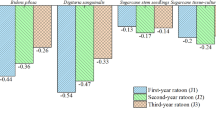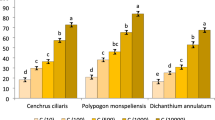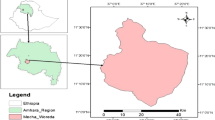Abstract
THE remarkable and all but fatal effect of growing grass over the roots of freshly planted apple trees has been studied at the Woburn Experimental Fruit Farm since 1894, and formed the subject-matter of the third report of that station (1903). No satisfactory explanation of the action was obtained. Experiment showed that it could not be attributed to the abstraction of food or moisture from the soil by the grass, nor to the influence of the grass on the soil temperature or on the gaseous contents of the soil, and subsequent experiments have excluded the formation of acid or alkali from the possible causes. The conclusion drawn was that the action was probably that of a poison produced either directly by the grass or indirectly through the agency of bacteria. Since the publication of this report, further work has been done on the subject, and the view that bacterial agency is concerned has become much strengthened. The action is not confined to any particular grasses, nor to apple trees, but different grasses and different kinds of trees act and suffer, respectively, to different extents. The difference in the results, however, produced by different soils are much more conspicuous, especially in cases where trees are not grassed over until a few years after they have been planted. Though the deleterious action of grass may generally be noticed throughout the country, many notable exceptions have been met with, and these cannot be explained by any of the patent characteristics of the soils in question. Various pot experiments have been made which emphasise these observations. Trees grown in earth in pots are affected by grass in just the same way as they generally are in the field, the grass reducing the growth and vigour of the tree by at least 50 per cent.; but if the trees are grown in sand instead of earth (suitable nourishment being supplied), the grass has very little effect on them, reducing their vigour by about 5 per cent, to 10 per cent. only.
This is a preview of subscription content, access via your institution
Access options
Subscribe to this journal
Receive 51 print issues and online access
$199.00 per year
only $3.90 per issue
Buy this article
- Purchase on Springer Link
- Instant access to full article PDF
Prices may be subject to local taxes which are calculated during checkout
Similar content being viewed by others
Rights and permissions
About this article
Cite this article
PICKERING, S. Root Action and Bacteria. Nature 76, 126–127 (1907). https://doi.org/10.1038/076126c0
Issue Date:
DOI: https://doi.org/10.1038/076126c0
Comments
By submitting a comment you agree to abide by our Terms and Community Guidelines. If you find something abusive or that does not comply with our terms or guidelines please flag it as inappropriate.



